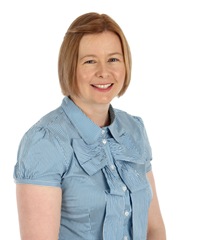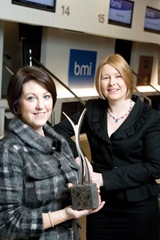Lindsay Fergus
 Lindsay Fergus is the business editor of the Belfast Telegraph. She has been a journalist for 15 years and has worked for newspapers including the Mourne Observer, News Letter, Sunday People, Daily Mirror and Ireland on Sunday.
Lindsay Fergus is the business editor of the Belfast Telegraph. She has been a journalist for 15 years and has worked for newspapers including the Mourne Observer, News Letter, Sunday People, Daily Mirror and Ireland on Sunday.
How did your journalistic career begin?
From my early grammar school days journalism had always been one of my top career choices, probably because I had the gift of the gab, enjoyed meeting people and other people’s stories. I did my workplacement with the Down Recorder in Downpatrick and after that week I knew newspaper journalism was definitely for me. After finishing my A-levels I went to BIFHE (now Belfast Met) to study NVQ level 4 in newspaper
journalism and as part of that course I returned to the Down Recorder for on the job training, which was invaluable. My first job as a junior reporter was with the Mourne Observer in Newcastle.
Please describe your daily routine?
As business editor of the Belfast Telegraph I am responsible for all business content in the newspaper including the daily finance pages, the weekly Business Telegraph supplement
and coverage for annual events such as our Business Awards and Northern Ireland’s Top 100 Companies.
I start at 10am and as the Belfast Telegraph has four daily editions my first task is to update that day’s business pages with any breaking news. Then I will source stories for the following day’s business pages and the next edition of Business Telegraph. In between times, I will deal with the dozens of phone calls and hundreds of emails I receive on a daily basis. I will also attend events in an effort to source stories and build up my contact base.
What makes a good business story?
There are always great breaking business stories with recent examples including the economic impact of the Icelandic volcano eruption and the trials and tribulations of Quinn Insurance. However, the stories, which are closest to my heart are the local business stories, particularly of SMEs who are breaking into new markets, launching unique products, expanding their operation and generally defying the economic downturn. These guys are the lifeblood of the local economy. I also love it when a Northern Ireland company contacts us with a story which develops over time. It’s great to follow their success and show other firms what can be achieved.
From your time in your job so far, what are the most memorable stories you have covered?
I moved into business journalism 18 months ago, at the height of the recession and numerous business stories made it onto the front pages with the historically low interest rates, plummeting mortgage rates, company collapses, soaring unemployment, changes to lending criteria and the firms who defied the odds. Business can sometimes be perceived as the poor relation in news but those stories proved that issues affecting the economy and finances impact on everyone. I also enjoy the Budget and analysing what the financial implications are for businesses and the ordinary man on the street.
What is most enjoyable about your job?
I love the diversity; every day is different. You never know when you arrive in what that day will hold for you, what story will break, what exclusive you may uncover. I have met so many new people from the world of business, many unsung heroes who are passionate about the economic success of Northern Ireland, in fact their enthusiasm is infectious. I also love that my job allows me to follow the success of SMEs and give them the recognition they deserve. The Belfast Telegraph Business Awards were also a high point for me this year, we had a record number of entries, great sponsors and a brilliant guest speaker in Karren Brady.
Northern Ireland’s private sector is relatively small. Does this help or hinder you as a business journalist?
We are heavily dependent on the public sector here but the size of the private sector is not a hindrance as it has so many fascinating stories. There are thousands of companies operating in the private sector here, some with just one employee and others with thousands.
Although the same names like Almac, Randox and FG Wilson tend to remain at the fore there is a long list of other companies with interesting tales – and unfortunately only so many business pages. However, many companies are reluctant to come forward with their achievements, perhaps from not understanding just how accessible newspapers are or not realising they have information that is newsworthy.
And what are the hardest parts?
Disappointing people! There are only so many pages available for business news and it means not all information given to us or sent to us makes it into print. Stories may not be newsworthy, pictures may not be strong enough visually or simply a major story will break, which means smaller stories fall by the wayside. Obviously as a journalist I have to write negative as well as positive stories but when that happens I just remind myself that presenting people with information, good and bad, is my job and it is up to the readers to do what they choose with that information.
How do you relax outside work?
It can be hard to switch off as a journalist because outside of work when you hear something your automatic instinct is to think ‘that would make a good story’. I find the best way to relax is by spending time with my family and friends. I enjoy dining out, baking, reading and going to the cinema. I am a big fan of Northern Ireland and I love exploring the province and its many attractions.





